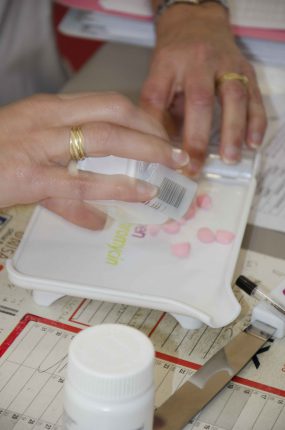Helping patients commit to lifelong HIV/AIDS treatment
This web page is archived for historical purposes and is no longer being updated.
By Nedson Zulu, MPH
Public Health Specialist (PHS) – Adult Treatment,
Centers for Disease Control and Prevention (CDC), South Africa

One pill a day can save your life.
When people are sick and medication is dispensed, many of them will take it as long as the symptoms persist. As soon as the symptoms subside, people often stop taking it and do not complete their full course of medication.
Think about HIV/AIDS and its lifelong antiretroviral treatment (ART). There’s a need to get patients’ lifelong commitment as soon as they start ART or there is a risk of people interrupting treatment at some point. This can result in some experiencing detectable viral load and some even becoming lost to follow-up care.
The lifelong commitment to ART is part of the plan outlined in the South African National Adherence Guidelines of 2016. Health care workers (HCW) at the health care facility should help patients develop an adherence plan that will ensure they remain in care, will adhere to ART treatment, and will achieve viral suppression.

Taking ART requires a lifelong commitment.
One way of getting patients’ commitment to ART treatment is through assisting them in setting life goals that can include seeing their children complete education, paying off a bond, or achieving viral suppression so that they can remain healthy, productive, and alive. These goals could be established by asking patients what they value in life, or what they expect or hope to achieve in life.
Once the goals have been set, the HCW should encourage the patient to start ART immediately if they haven’t already started. If the patient is reluctant to start treatment, the HCW should arrange for him or her to meet with an expert patient from a support group or a peer educator so that the patient can learn from their experiences and dispel any myths or misconceptions. Newly diagnosed patients can also be referred to the Integrated Access to Care and Treatment (I-ACT) support groups, where they can learn more about HIV, acceptance of their status, treatment options, and learn about healthy living.
As soon as patients start ART they should be encouraged to identify someone close to them, such as a family member or a trusted friend, who can remind them to take their medication on time every day and who will support them in their treatment journey. Later, when patients are released from the facility, they can also nominate this person to obtain their medication from the pick-up-point in the event they are unable to go get it.

Make the right decision and stick to it.
It is also important to help patients develop a schedule of when they take the medication. They need to have reminders in place to remind them to take their medication. If they miss a dose, they should take it as soon as they remember.
If a patient plans to travel, they should always contact the HCW so that they are given enough medication to cover the period they will be away. In case of unplanned trips, such as travel related to funeral, they should always report to the nearest health facility where they have traveled so that they can get treatment. They will need to provide evidence of their medical condition and current medication.
Every time a patient faces challenges in taking their treatment, they should be reminded of their life goals. If the challenges relate to substance use, the patient should be advised to minimize their substance use and to take their medication at the scheduled time. For challenges relating to side effects, patients should be advised to see a HCW if the side effects persist.
The HCW should help prepare the patient for the first viral load test as they approach the six-month mark. The patients should be counseled and educated about why it is important to take the test and what it measures.
The adherence plan is a tool that will assist patients in remaining in care and adhering to their treatment plan. This will contribute significantly towards achieving epidemic control. HCW are encouraged to use this tool on every patient who is on lifelong HIV/AIDS treatment.